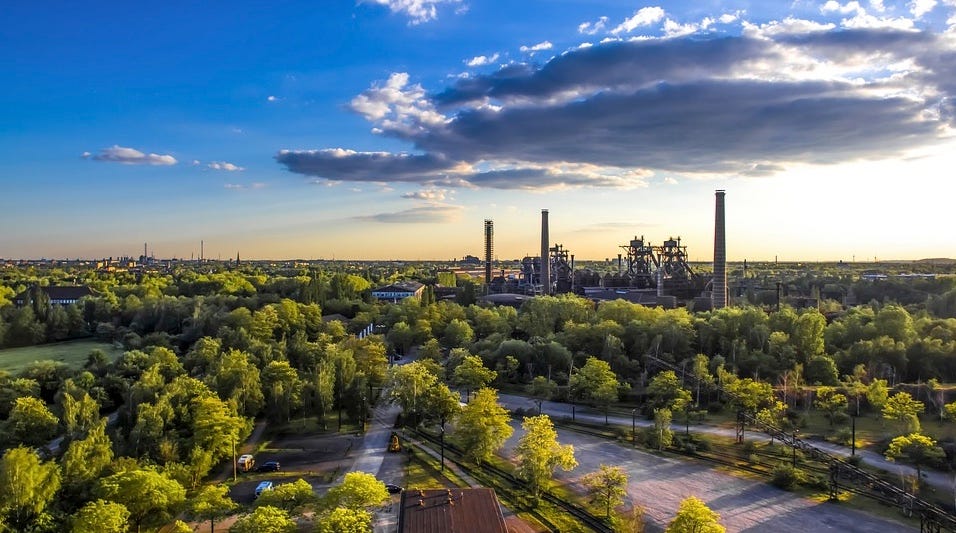A new path for Old Oil; plus Biden's Plan B on infrastructure
Welcome to Callaway Climate Insights. ESG investors are still celebrating Wednesday's historic victories over the oil giants. Please share our latest analysis.

Oil prices rose Thursday.
With environmental activists still celebrating the historic hat trick of legal and shareholder victories Wednesday against ExxonMobil (XOM), Chevron (CVX) and Shell (RDS.B), and their stocks down accordingly, commodity investors at least moved back to the reality that oil will be with us for a while.
That’s not to say environmental, social and governance (ESG) investors shouldn’t continue relishing the landmark results. As we report in our EU notebook and Insights columns below, the gauntlet is already being thrown down for more lawsuits and resolutions in Europe — but particularly in the U.S. where they are more common.
But even as we look toward more investment in renewable energy and reductions of fossil fuel use, the climate clock ticks on. The World Meteorological Organization reported this morning there is a 40% chance the world will experience a rise in temperature above the Paris Agreement’s 1.5°C. goal in the next five years. Last year, that estimate was 20%.
Some countries, such as Mexico, China and parts of the Middle East, are increasing oil production as we speak. The United Arab Emirates, which expects to boost production to more than five million barrels by 2030, even wants to host the COP28 global climate summit two years from now.
What this means for global warming is that the big oil companies such as Exxon, Shell and Chevron will not only have to comply with new rulings and shareholder resolutions to cut fossil fuel production and invest in renewables, they are going to need to lead. A tall order indeed.
More insights below. . . .
Don’t forget to contact me directly if you have suggestions or ideas at dcallaway@callawayclimateinsights.com.
ZEUS: Biden’s Plan B on infrastructure bill

. . . . Now that the Republicans have played their card on the infrastructure bill, it’s time for President Joe Biden and the Democrats to decide whether compromise is possible, or whether to try to ram it through using the controversial reconciliation strategy, writes David Callaway. Despite the traditional animosity over the plan’s call for higher taxes on the wealthy, a deal could be reached on key components of the strategy that would push the U.S. into the a new renewable era. But a lot of stuff is going to have to go. . . .
Rethinking the potential for the emerging green bond market

. . . . The surge in green bond financing to date has been more an exercise in greenwashing than a revolutionary new way to finance the fight against global warming, but that could soon change, writes Mark Hulbert. A new study out of Harvard Business School has found the elusive green bond premium in many of the $1.2 trillion in green financings, leading Hulbert to, grudgingly, admit that there is scope for real impact in Wall Street’s latest trend. The question now — with $90 trillion in climate financing needed by the end of the decade to mitigate the worst of global warming — is whether it will be enough to make a difference. . . .
EU notebook: Shell ruling ripples across Europe as activists urge more lawsuits
. . . . The decision by a Dutch court that Shell (RDS.A), the world’s biggest non-state oil company, must more than double its carbon cleanup efforts has rocked the fossil fuel industry, with predictions that the result could be reproduced in other jurisdictions, Vish Gain writes from Dublin. Whether it’s a “turning point,” as a Friends of the Earth lawyer claimed, is still in question, but it certainly could spur other oil giants to start to get their act together.
Thursday’s insights: Drilling in Alaska or saving the prairie chicken?
. . . . With a decision not to undo a Trump-era decision to allow oil and gas drilling in Alaska’s Arctic Wildlife Refuge, Biden has proved susceptible to political pressure — this time from moderate Republican Lisa Murkowski, whose support he desperately needs in the 50-50 U.S. Senate. (But the White House stood firm in its mission to get the lesser prairie chicken, above, put on the endangered species list.) Read more here. . . .
. . . . In another legal victory for environmentalists, the Australian government has been told it has a duty to protect children’s health from the proposed expansion of a giant coal mine. That, and a landmark loss by Shell in a Dutch court, give considerable momentum to about 1,800 similar lawsuits around the world, the vast majority of them in the U.S. Read more here. . . .
Editor’s picks: A dam debate; plus new Pew research spotlights ‘generational differences’ on climate
Debate flares over the benefits of dam projects
As Western states wither under severe drought conditions, the debate has reignited about whether and where to invest in large dam projects, Karin Rives writes for S&P Global Market Intelligence. Rives notes that at a recent hearing with Republican members of the House Natural Resources Committee, lawmakers and witnesses criticized a decision by Democratic California Gov. Gavin Newsom to halt a $1.3 billion plan by the Trump administration to raise Shasta Dam. Shasta Dam, in Northern California, is owned by the federal government and provides water storage and powers a hydroelectric plant connected to the western power grid. Rives notes that while some see adding water storage as a solution for the future, others argue such infrastructure projects are bad investments because they are not likely to be filled as water flows dwindle.
Gen Z, millennials stand up for climate change
Most Americans favor using a mix of energy sources to meet the country’s needs — including renewables as well as oil, coal and natural gas, according to a new report from Pew Research Center. But there is limited support for phasing out the use of fossil fuels altogether. And the public is closely divided over the idea of phasing out the production of gas-powered vehicles by 2035, Pew said. The report also shows there are “meaningful generational differences over the need for climate action, and engagement with the issue, stand alongside these partisan divisions. … Compared with older adults, Gen Z’ers and millennials are talking more about the need for action on climate change; among social media users, they are seeing more climate change content online; and they are doing more to get involved with the issue through activities such as volunteering and attending rallies and protests.”
Subscribe with a free 30-day trial to read all the news.
Latest findings: New research, studies and projects

Industry Tracker offers investors analysis on decarbonization efforts
The group behind Carbon Tracker and Planet Tracker has launched a research house for investors called Industry Tracker, to provide independent research and analysis on industrial sectors that are critical to economies and will be a key component of the pathway towards achieving net zero emissions. It will provide investors with the evidence base they need to engage with companies in these climate-critical sectors on their transition plans and facilitate the redirection of capital to provide the deep emissions cuts needed for the decarbonization of the global economy, the Carbon Tracker initiative said in a statement. Industry Tracker is being launched by the team that set up Carbon Tracker and Planet Tracker, alongside Carole Ferguson, who has been leading the award-winning investor research team at CDP, the non-profit which runs the world’s environmental disclosure system. Industry Tracker’s first piece of research will be published this summer, focusing on the European steel industry and its scope to adopt hydrogen technology to transition away from carbon-intensive blast furnace plants.
More of the latest research:

Words to live by . . . .
“Never doubt that a small group of thoughtful, committed citizens can change the world; indeed, it is the only thing that ever has.” — Anthropologist Margaret Mead.




